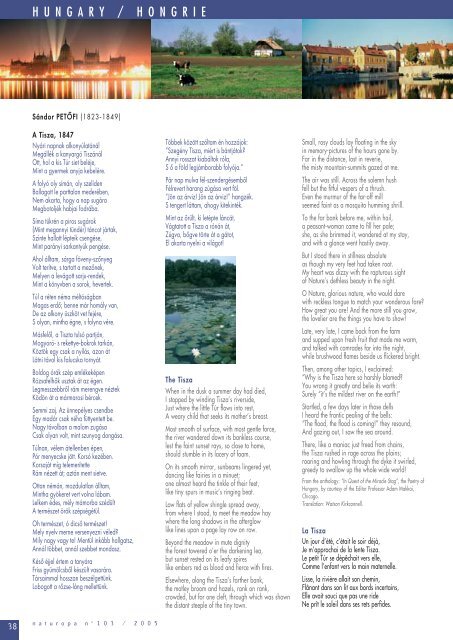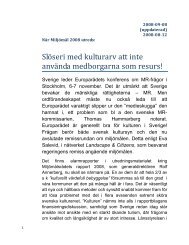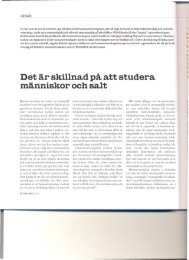Landscape through literature Le paysage à travers la littérature
Landscape through literature Le paysage à travers la littérature
Landscape through literature Le paysage à travers la littérature
Create successful ePaper yourself
Turn your PDF publications into a flip-book with our unique Google optimized e-Paper software.
38<br />
H U N G A R Y / H O N G R I E<br />
Sándor PETŐFI (1823-1849)<br />
A Tisza, 1847<br />
Nyári napnak alkonyú<strong>la</strong>tánál<br />
Megállék a kanyargó Tiszánál<br />
Ott, hol a kis Túr siet beléje,<br />
Mint a gyermek anyja kebelére.<br />
A folyó oly símán, oly szelíden<br />
Bal<strong>la</strong>gott le partta<strong>la</strong>n mederében,<br />
Nem akarta, hogy a nap sugára<br />
Megbotoljék habjai fodrába.<br />
Síma tükrén a piros sugárok<br />
(Mint megannyi tündér) táncot jártak,<br />
Szinte hallott lépteik csengése,<br />
Mint parányi sarkantyúk pengése.<br />
Ahol álltam, sárga föveny-szőnyeg<br />
Volt terítve, s tartott a mezőnek,<br />
Melyen a levágott sarju-rendek,<br />
Mint a könyvben a sorok, hevertek.<br />
Túl a réten néma méltóságban<br />
Magas erdő; benne már homály van,<br />
De az alkony üszköt vet fejére,<br />
S olyan, mintha égne, s folyna vére.<br />
Másfelől, a Tiszta tulsó partján,<br />
Mogyoró- s rekettye-bokrok tarkán,<br />
Köztök egy csak a nyílás, azon át<br />
Látni távol kis falucska tornyát.<br />
Boldog órák szép emlékeképen<br />
Rózsafelhők usztak át az égen.<br />
<strong>Le</strong>gmesszebbről rám merengve néztek<br />
Ködön át a mármarosi bércek.<br />
Semmi zaj. Az ünnepélyes csendbe<br />
Egy madár csak néha füttyentett be.<br />
Nagy távolban a malom zugása<br />
Csak olyan volt, mint szunyog dongása.<br />
Túlnan, vélem átellenben épen,<br />
Pór menyecske jött. Korsó kezében.<br />
Korsaját míg telemerítette<br />
Rám nézett át; aztán ment sietve.<br />
Ottan némán, mozdu<strong>la</strong>t<strong>la</strong>n álltam,<br />
Mintha gyökeret vert volna lábam.<br />
<strong>Le</strong>lkem édes, mély mámorba szédült<br />
A természet örök szépségétül.<br />
Oh természet, ó dicső természet!<br />
Mely nyelv merne versenyezni véled?<br />
Mily nagy vagy te! Mentül inkább hallgatsz,<br />
Annál többet, annál szebbet mondasz.<br />
Késő éjjel értem a tanyára<br />
Friss gyümölcsből készült vasorára.<br />
Társaimmal hosszan beszélgettünk.<br />
Lobogott a rőzse-láng mellettünk.<br />
n a t u r o p a n o 1 0 3 / 2 0 0 5<br />
Többek között szóltam én hozzájok:<br />
“Szegény Tisza, miért is bántjátok?<br />
Annyi rosszat kiabáltok ró<strong>la</strong>,<br />
S ő a föld legjámborabb folyója.”<br />
Pár nap mulva fél-szendergésemből<br />
Félrevert harang zúgása vert föl.<br />
“Jön az árviz! Jön az árviz!” hangzék.<br />
S tengert láttam, ahogy kitekinték.<br />
Mint az őrült, ki letépte láncát,<br />
Vágtatott a Tisza a rónán át,<br />
Zúgva, bőgve törte át a gátot,<br />
El akarta nyelni a világot!<br />
The Tisza<br />
When in the dusk a summer day had died,<br />
I stopped by winding Tisza’s riverside,<br />
Just where the little Túr flows into rest,<br />
A weary child that seeks its mother’s breast.<br />
Most smooth of surface, with most gentle force,<br />
the river wandered down its bankless course,<br />
lest the faint sunset rays, so close to home,<br />
should stumble in its <strong>la</strong>cery of foam.<br />
On its smooth mirror, sunbeams lingered yet,<br />
dancing like fairies in a minuet;<br />
one almost heard the tinkle of their feet,<br />
like tiny spurs in music’s ringing beat.<br />
Low f<strong>la</strong>ts of yellow shingle spread away,<br />
from where I stood, to meet the meadow hay<br />
where the long shadows in the afterglow<br />
like lines upon a page <strong>la</strong>y row on row.<br />
Beyond the meadow in mute dignity<br />
the forest towered o’er the darkening lea,<br />
but sunset rested on its leafy spires<br />
like embers red as blood and fierce with fires.<br />
Elsewhere, along the Tisza’s farther bank,<br />
the motley broom and hazels, rank on rank,<br />
crowded, but for one cleft, <strong>through</strong> which was shown<br />
the distant steeple of the tiny town.<br />
Small, rosy clouds <strong>la</strong>y floating in the sky<br />
in memory-pictures of the hours gone by.<br />
Far in the distance, lost in reverie,<br />
the misty mountain-summits gazed at me.<br />
The air was still. Across the solemn hush<br />
fell but the fitful vespers of a thrush.<br />
Even the murmur of the far-off mill<br />
seemed faint as a mosquito humming shrill.<br />
To the far bank before me, within hail,<br />
a peasant-woman came to fill her pale;<br />
she, as she brimmed it, wondered at my stay,<br />
and with a g<strong>la</strong>nce went hastily away.<br />
But I stood there in stillness absolute<br />
as though my very feet had taken root.<br />
My heart was dizzy with the rapturous sight<br />
of Nature’s dethless beauty in the night.<br />
O Nature, glorious nature, who would dare<br />
with reckless tongue to match your wonderous fare?<br />
How great you are! And the more still you grow,<br />
the lovelier are the things you have to show!<br />
Late, very <strong>la</strong>te, I came back from the farm<br />
and supped upon fresh fruit that made me warm,<br />
and talked with comrades far into the night,<br />
while brushwood f<strong>la</strong>mes beside us flickered bright.<br />
Then, among other topics, I exc<strong>la</strong>imed:<br />
“Why is the Tisza here so harshly b<strong>la</strong>med?<br />
You wrong it greatly and belie its worth:<br />
Surely “it’s the mildest river on the earth!”<br />
Startled, a few days <strong>la</strong>ter in those dells<br />
I heard the frantic pealing of the bells:<br />
“The flood, the flood is coming!” they resound,<br />
And gazing out, I saw the sea around.<br />
There, like a maniac just freed from chains,<br />
the Tisza rushed in rage across the p<strong>la</strong>ins;<br />
roaring and howling <strong>through</strong> the dyke it swirled,<br />
greedy to swallow up the whole wide world!<br />
From the anthology: “In Quest of the Miracle Stag”, the Poetry of<br />
Hungary, by courtesy of the Editor Professor Adam Makkai,<br />
Chicago.<br />
Trans<strong>la</strong>tion: Watson Kirkconnell.<br />
La Tisza<br />
Un jour d’été, c’était le soir déj<strong>à</strong>,<br />
Je m’approchai de <strong>la</strong> lente Tisza.<br />
<strong>Le</strong> petit Túr se dépêchait vers elle,<br />
Comme l’enfant vers <strong>la</strong> main maternelle.<br />
Lisse, <strong>la</strong> rivière al<strong>la</strong>it son chemin,<br />
Flânant dans son lit aux bords incertains,<br />
Elle avait souci que pas une ride<br />
Ne prît le soleil dans ses rets perfides.





